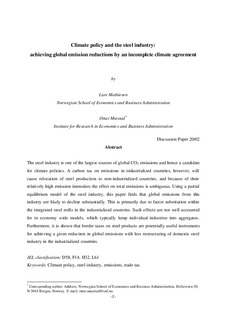Climate policy and the steel industry : achieving global emission reductions by an incomplete climate agreement
Working paper
Permanent lenke
http://hdl.handle.net/11250/163006Utgivelsesdato
2002-10Metadata
Vis full innførselSamlinger
- Discussion papers (SAM) [657]
Sammendrag
The steel industry is one of the largest sources of global CO2 emissions and hence a candidate
for climate policies. A carbon tax on emissions in industrialized countries, however, will
cause relocation of steel production to non-industrialized countries, and because of their
relatively high emission intensities the effect on total emissions is ambiguous. Using a partial
equilibrium model of the steel industry, this paper finds that global emissions from this
industry are likely to decline substantially. This is primarily due to factor substitution within
the integrated steel mills in the industrialized countries. Such effects are not well accounted
for in economy wide models, which typically lump individual industries into aggregates.
Furthermore, it is shown that border taxes on steel products are potentially useful instruments
for achieving a given reduction in global emissions with less restructuring of domestic steel industry in the industrialized countries.
Utgiver
Norwegian School of Economics and Business Administration. Department of EconomicsSerie
Discussion paper2002:20
